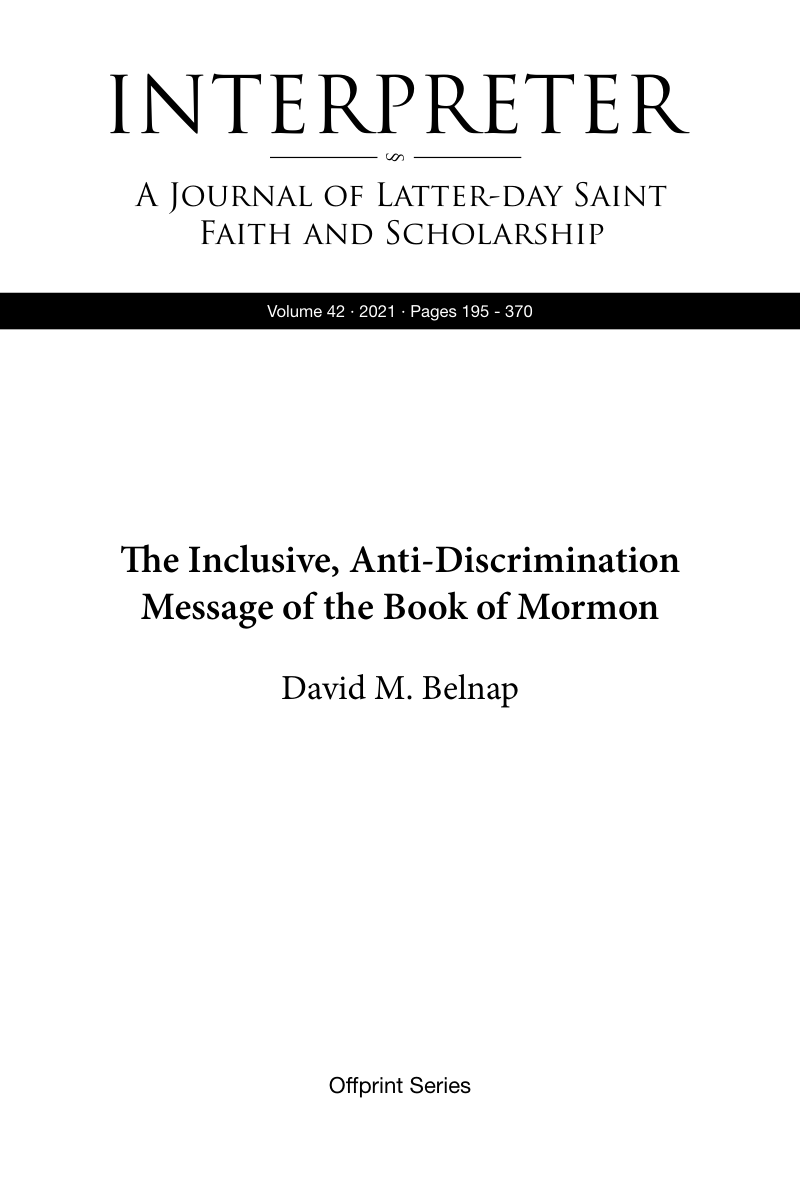David M. Belnap argues that the Book of Mormon's message is opposed to racism and other forms of discrimination.
- Type
- Academic / Technical Report
- Source
- David M. Belnap LDS
- Hearsay
- DirectSecondary
- Reference
David M. Belnap, "The Inclusive, Anti-Discrimation Message of the Book of Mormon," Interpreter: A Journal of Latter-day Saint Faith and Scholarship 42 (2021): 195-370
- Scribe/Publisher
- Interpreter: A Journal of Latter-day Saint Faith and Scholarship
- People
- David M. Belnap
- Audience
- Reading Public
- Transcription
Abstract: Attitudes of superiority lead to societal conflict. The racial interpretation of a few Book of Mormon verses has contributed to these attitudes and conflicts, yet hundreds of inclusive messages are found in more than half of the book’s verses. God’s message, love, mercy, and justice are for all people. Righteous people did not think themselves above others, nor did they persecute others or start wars. War is tragic and is caused by wickedness. Conspiracies are a great evil. Righteous people were kind in their attitudes and actions, regardless of others’ social status or ethnicity. Some Book of Mormon people even gave their lives or put their lives at risk to act kindly, and some of these went from hating others to giving up their lives on behalf of others. The inclusive messages in the Book of Mormon are consistent with the position advocated by current Latter-day Saint leaders condemning all racism and disavowing racist hypotheses such as those derived from a few Book of Mormon verses (i.e., that skin color is related to righteousness). The inclusive messages also are consistent with the view that skin color in the Book of Mormon is not literal but is metaphorical. The Book of Mormon instructs us that the right way to interact is with love and respect, through examples of people respecting and reaching out to others, promises to all people, condemnation of unkindness and anti-Semitism, calls to all people to repent, and emphasizing the flaws of one’s own group and not those of others.
. . .
[Conclusion]
Despite obvious reasons to hate their Lamanite enemies, righteous Nephites in the Book of Mormon chose to put differences aside in their dealings with the Lamanites. Despite deep traditions of resentment and bitterness, righteous Lamanites were also exemplary in their dealings with the Nephites. Righteous Lamanites and Nephites also acted honorably toward others within their own nations. Today, whatever the apparent justifications for racial, ethnic, international, or class strife may be, whatever the reasons for divisions or for others’ circumstances and regardless of a person’s ethnicity, economic class, gender, or other characteristic, you and I can and should choose to love and reach out to others. Furthermore, let us not condemn or misread a book that overwhelmingly teaches us to love and serve others — however different from us they may be — because we live in a different time and culture, have different expectations, and are confused by a very small number of its passages.
- Citations in Mormonr Qnas
The B. H. Roberts Foundation is not owned by, operated by, or affiliated with the Church of Jesus Christ of Latter-day Saints.

